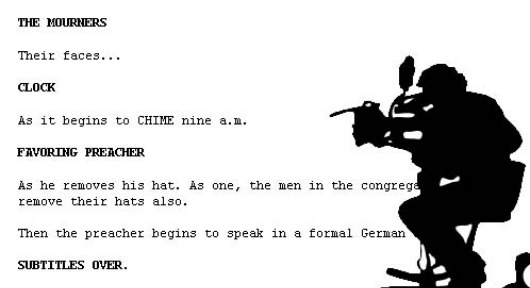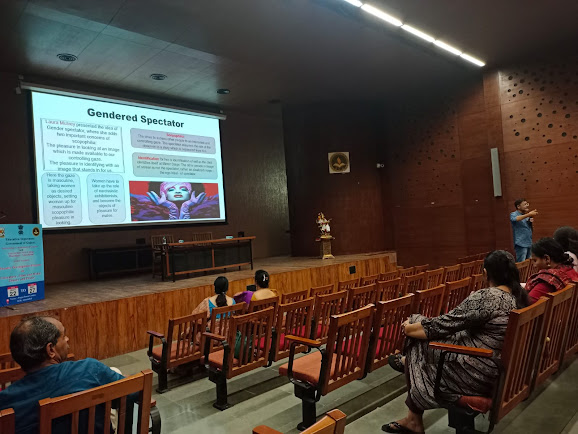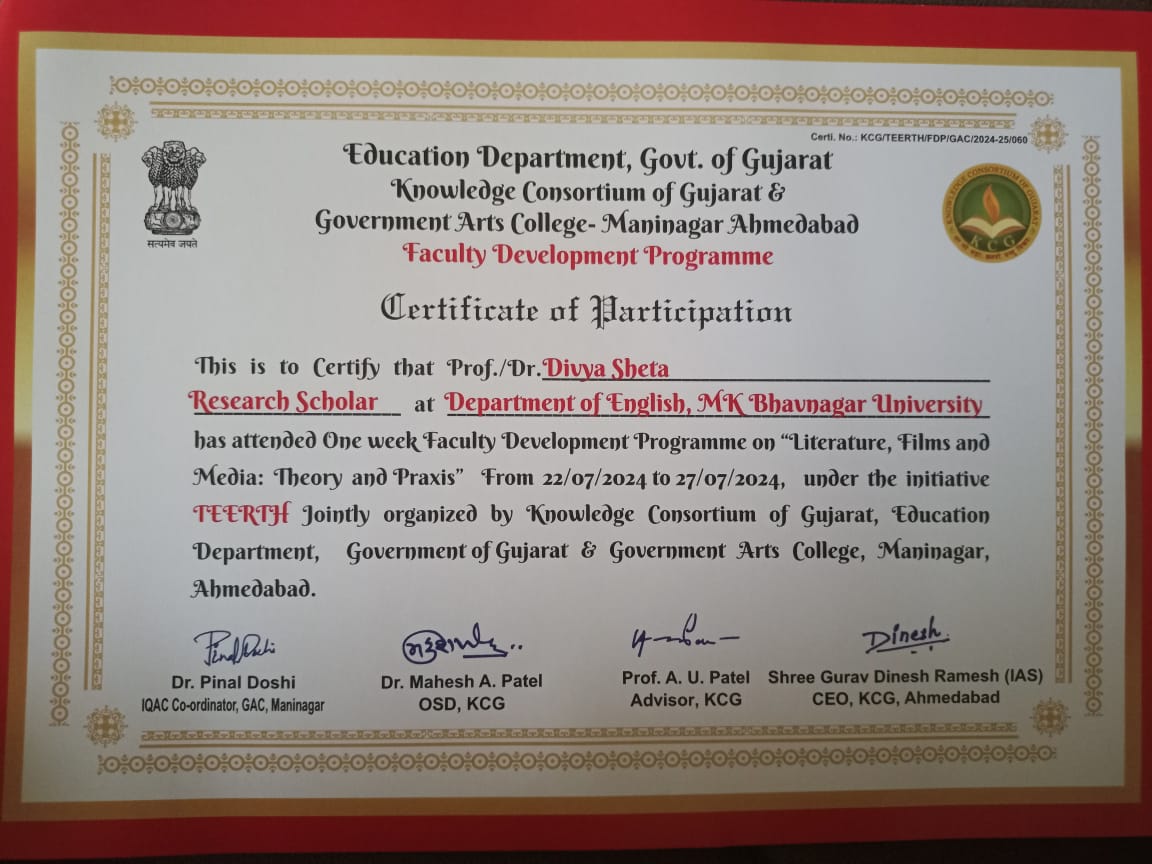GOVERNMENT ARTS COLLEGE, MANINAGAR Shri K.K. Shastri Educational Campus, Ahmedabad & KNOWLEDGE CONSORTIUM OF GUJARAT jointly organized One Week Faculty Development Program on Dates of FDP: 22/07/2024 to 27/07/2024 Place: Knowledge Consortium of Gujarat (KCG).

OBJECTIVES OF THE FACULTY DEVELOPMENT PROGRAMME:
- The objective of the FDP on ‘Literature, Films and Media’ study is to analyze and interpret texts, films and media products in order to gain insight into their growth, development, application and interconnectedness as well as understand its massive impact on the present generation.
- To acquire knowledge about its theory and praxis and gain an in depth understanding of the process of creating literary texts, cinematic and media adaptations, scriptwriting and screen plays for films, TV shows, web series and other media contents such as blogging, vlogging, podcasts, audiobooks, news stories, advertising, documentary making, radio jockeying and e story telling.
- To learn how to interpret and evaluate texts, films and other media products critically.
- To gain knowledge about how literature and media can be used to break time, distance, geographical and language barriers and construct and challenge existing power structures and hierarchies.
- To gain a better understanding of the role of literary texts, films and media in building, reinforcing and reforming cultural identities and values as well as addressing psychological, social, political and economic issues. (from the given brochure)
I had the honor of participating in One Week Faculty Development Program on 'Literature, Films, and Media: Theory and Praxis' jointly organized by Government Arts College, Maninagar, Shri K.K. Shastri Educational Campus, Ahmedabad & Knowledge Consortium of Gujarat. I learned many new things and theories, detailed outcomes from the speakers' learnings, and more insights.
DAY 1: 22/07/2024, Monday.

After the inaugural session, the first two sessions were delivered by Shri Amrit Gangar who is an author, film theoretician, historian, and curator, on "Living, Teaching and Interacting in a Time of Erasure: When
a Vision of the Past Persists" and "Word and Image: Process of Transmogrification-LiteratureCinema Symbiosis." From the birth of cinema with deep roots in caves to modern cinema to AI concepts and implements in cinema, sir profoundly explained how we need to focus on 'value adding in cinema' apart from other implements.
The third session on "લોકકથાઓ અને સિનેમા" was sermonized by Shri Arvind Barot who is Gujarati poet, lyricist, composer and playback singer. He beautifully shared his experiences, decoded folksongs, and how they were used in Gujarati films.

Forth session was on "રાષ્ટ્રીય મહાકાવ્ય રામાયણ અને હિન્દી ચલચિત્રો" that orated by Prof. (Dr.) Vijay Pandya is a Former Professor, Sanskrit Department, at Gujarat University and a Recipient of ‘Rashtrapati-Puraskar'. Sir has vast insights into Ramayan and its translation and how we can read and implant Rama and other characters in our daily lives.
DAY 2: 23/07/2024, Tuesday.

First two sessions were delivered by Shri Anjum Rajabali, an Indian Screen Writer and Teacher on Recurring Archetypal Dilemmas in Life, Mythology, and Cinema. Sir meticulously expounds the session on Mythology and its deep roots in our lives and importantly in cinema. Mythology is an experience and feelings. From planets to Darwin to Freud, myth has its own foundations. Many archetypal readings sir gave examples from Mahabharata specifically, like Ganga's decision, Kunti, Arjuna, Nhishma,, Shantanu, Ganga - character's archetypal reading, etc. Importantly, sir also said,' Myth tells us to keep rolling your real character, your real life within the real world where you are living, otherwise, things will go wrong'. Sir called mythology is an ART. These kinds of archetypal readings of every character and situation in mythologies are deeply derived from ourselves and it is for ourselves to not make mistakes in life!

Second session was on "Digital Media as the New Pedagogical Tool" by Dr.Indira Nityanandam, Former Principal, S.R. Mehta Arts College & Dr. Shubha Nigam, Associate Professor, English Department, L.D. Arts College and Podcaster, YouTuber, and Voice Over Artist. Madam talked about the importance of digital tools and media to develop and enhance our teaching skills under the follow-ups given by UGC for teaching with technology that is ICT in education. They mentioned their creative videos and what are the difficulties they faced during making, editing, and preparing content, and all things.

Third session was held by Dr. Bharat Mehta, Professor, Department of Gujarati, M.S. University, Vadodara, on "તાર્કિકતા ના ત્રાજવે મિડિયા, સાહિત્ય અને સિનેમા" Sir talked about critical thinking that whatever as a viewer you have queries, you have to ask. Sir's major focus of the talk was on critical thinking and questioning after watching any art of creation.

DAY 3: 24/07/2024, Wednesday.
First two sessions were held by Shri Sanskar Desai, Film Maker, Script Writer, and President, of IDPA, on "Documentary Film Making". From how to make documentaries, and types of documentaries to the post-production concern, sir provided a wide range of knowledge about documenting things, real-life events, and characters. As sir mentioned through the session the presentation of a story should be effective to the viewers. Documentary films were started before feature films. It can be subjective and objective documentation with Facts.


Second session was on "Writing for the Screen: Forms, Format, and Tools" by Dr. Nutan Kotak, Head, Department of English, Gujarat
University, Ahmedabad. Ma'am delivered her talk on how to decide the stakes of the story to start writing in a particular format to use specific tools. We have to be very careful during writing from - acts to sequences to scenes to beats to shots.

Third session was on સાહિત્યિક કૃતિનું સિનેમા રૂપાંતરણ અને ટી.વી. સીરીઝ રાઈટિંગ by Shri Ram Mori, Gujarati Script Writer and Playwright. Sir delivered his fabulous creative skills on scriptwriting from the original story and how we can present it on the screen because there the audience is changed than a reading audience. Also discussed Pakistani series and Indian TV series and how they differ from each other. As sir mentioned, a screenwriter has 'creative freedom' while adapting stories from literature to screen/cinema.


DAY 4: 25/07/2024, Thursday.
First two sessions were held by Shri Mayur Puri, Indian Script Writer and Lyricist on ‘Tech And Creativity (evolution and impact of technology in creative fields)’ and ‘The Art of ‘Trans-Creation’ (Introduction to Localising global content for Indian markets)’. Sir precisely delivered his talks on Tach and the Creative process. How tech involved in human society throughout history and how it can create a better life. From his working life experience in transcreation in movies such as Lion King, and Jungle Book, sir talked about difficulties and challenges while translating such words from English to Hindi, and how we have very carefully while creating the words for the regional language. Secondly, sir conscientiously talked about key elements in narrative structures, (12 key elements of a story), how to understand the creative vision, and how to respect the original source material, reverse racism, etc.


Second session was on "Importance of Story Telling" by Ms. Dipali Chatwani, Vlogger, Social-Media Manager, and Founder Contentkosh. From her working life experience, she shared the importance of storytelling through podcasting, vlogging, blogging, and other mediums.

Last session of the day was on "સાહિત્ય અને ટેલિવિઝન" by Dr. Rupa Mehta, Former Director, Doordarshan Kendra Ahmedabad. Ma'am has wide working experience on Gujarat's one and only elderly channel Doordarshan. She shared that in television, we have to keep 'close-ups' only to easily explain the viewers about the main idea of the story. She also shared several old television shows.

DAY 5: 26/07/2024, Friday.
First session was on "Literature and Mythological Films Interactive Session" by Dr. Rucha Brahmbhatt, Associate Professor & HoD,
English Department, Samarpan Arts and Commerce
College, Gandhinagar. Ma'am profoundly delivered her session on how new myths come through cinema. First ma'am decoded the words Myth and Mythology, and Metamyth and referred to some prominent critics such as Robert Segal and Antony Derr, she wonderfully talked about technological advancements with myths and of course in films.

Second session was on "Children Film Industry in India: Issues and Challenges" by Dr. Sonal Pandya, Head, Department of Journalism and
Mass-Communication, Gujarat University. She talked about her surveys and research on Children Film and the industry and the current challenges and upcoming challenges as well. The primary focus of watching this kind of film is to give the reason how to see the film and we have the wrong way of seeing the character as a 'Fan' of some popular figure from the film, is too much wrong attachment which should be changed in a theoretical way.
Third session was on ગુજરાતી સિનેમા અને સાહિત્ય by Ms. Malti Mehta, Media & Film Educator and Documentary Film Maker, Former Director, EMRC, Coordinator Centre for Development Communication, Guj. Uni. Ahmedabad. Ma'am talked about how the roots of the history of cinema and Gujarati literature have changed over time and the process of adempting the kind of story has changed.

Fourth session was on "Celluloid Dreams: Cinema" delivered by Dr. J.A.H. Khatri sir, assistant professor at School of Liberal Studies & Education at Navrachana University, Vadodara. Sir profoundly talked about cinematic reading and theories such as Auteur theory and Genere theory and how these two very important theoretical standpoints are important to read cinema. Sir discussed about Indian Cinema and reading about, Creating Her, The Heroine: The Comforter, and Identifying Villian. signifier in cinema is always 'imagining' that has no real-world connection. Sir also expounds on Cinema Spectatorship - as Christian Metz identified three processes: Identification, Voyeurism, and Fetishism. Second about Gendered Spectator was presented by Laura Mulvey- Scopophilia and Identification.

DAY 6: 27/07/2024, Saturday.
The last day and last session was on "Cinema Educates Society" by Shri Abhishek Shah, Indian Film Maker, Director, and Playwright (Director and Writer of Helaro). Sir discussed the innovative ways in which any folktale might be portrayed, such as letting the audience choose how the movie ends. The film should leave you with a lasting impression and something to ponder after you have watched it.
Final learning outcome generated by ChatGPT by providing this blogpost link:
- Develop the ability to critically analyze and interpret various forms of media, including literature, films, and digital content.
- Gain comprehensive knowledge of the processes involved in creating and adapting these media.
- Understand the cultural and social impacts of media.
- Learn to utilize media as a pedagogical tool.
- Foster critical thinking.
- Appreciate media's role in shaping and reflecting societal values and issues.


























No comments:
Post a Comment